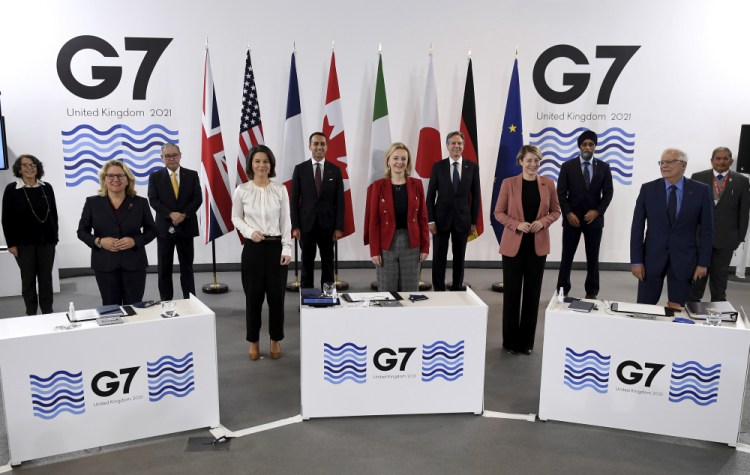Foreign ministers from the Group of Seven nations on Sunday warned Russia to de-escalate its activities around Ukraine or face “massive consequences.”
In a joint statement, the ministers said they were “united in our condemnation of Russia’s military build-up and aggressive rhetoric towards Ukraine.”
“We call on Russia to de-escalate, pursue diplomatic channels, and abide by its international commitments on transparency of military activities,” the ministers said in the statement after a meeting in Liverpool, England.
While President Biden seeks to strengthen diplomatic pressure and pump up the rhetoric, options for squeezing the Kremlin financially, economically and militarily face their own challenges. The G-7 statement didn’t spell out which consequences Russia might face.
The U.S. and European allies are weighing sanctions targeting Russia’s biggest banks and its foreign exchange access, people familiar with the matter said last week. Yet banning Russia’s access to the Swift payments system would harm ordinary citizens, so officials are more inclined to go after its ability to convert rubles into Western currencies, the people said.
Germany’s new government, which includes the Green party, has come under pressure to link the fate of the Nord Stream 2 pipeline to Russia backing off Ukraine. German Chancellor Olaf Scholz, whose Social Democrats previously backed the natural gas link as Angela Merkel’s junior partner, hasn’t tipped his hand yet.
Biden on Saturday warned Russia of “devastating” economic penalties if it attacks Ukraine and said more U.S. and NATO troops would be sent to defend allies. Separately, U.S. Treasury Secretary Janet Yellen spoke with her German counterpart on Friday to discuss steps that could “impose severe costs on Russia’s economy” if needed.
With increasing numbers of troops and military equipment deployed near Ukraine’s border, the U.S. has warned for weeks that Russian President Vladimir Putin has drawn up plans for an invasion that could take place in early 2022. Putin has denied any intention to invade.
Putin and Biden spoke on a two-hour video call last week, in which the Russian said he’d be prepared for an in-person meeting, according to footage shown on the Rossiya-1 TV channel on Sunday.
That’s “pretty unlikely” right now, U.S. Secretary of State Antony Blinken said in an interview with NBC’s “Meet the Press” on Sunday.
Since Russia annexed Crimea from Ukraine and backed a separatist uprising in eastern Ukraine in 2014, the U.S. has imposed a series of sanctions, including travel bans, asset freezes and finance and trade restrictions. Those measures, and European economic sanctions, have failed to dislodge Russia or halt fighting in eastern Ukraine.
A senior State Department official expressed confidence on Saturday that a broad group of countries, including other G-7 nations, would join in imposing costs on Russia if it moved on Ukraine.
G-7 members agree that changing European borders by force would have “enormous political and economic consequences,” Annalena Baerbock, appointed last week as Germany’s first female foreign minister, said in comments on ARD television.
Copy the Story LinkSend questions/comments to the editors.



Success. Please wait for the page to reload. If the page does not reload within 5 seconds, please refresh the page.
Enter your email and password to access comments.
Hi, to comment on stories you must . This profile is in addition to your subscription and website login.
Already have a commenting profile? .
Invalid username/password.
Please check your email to confirm and complete your registration.
Only subscribers are eligible to post comments. Please subscribe or login first for digital access. Here’s why.
Use the form below to reset your password. When you've submitted your account email, we will send an email with a reset code.